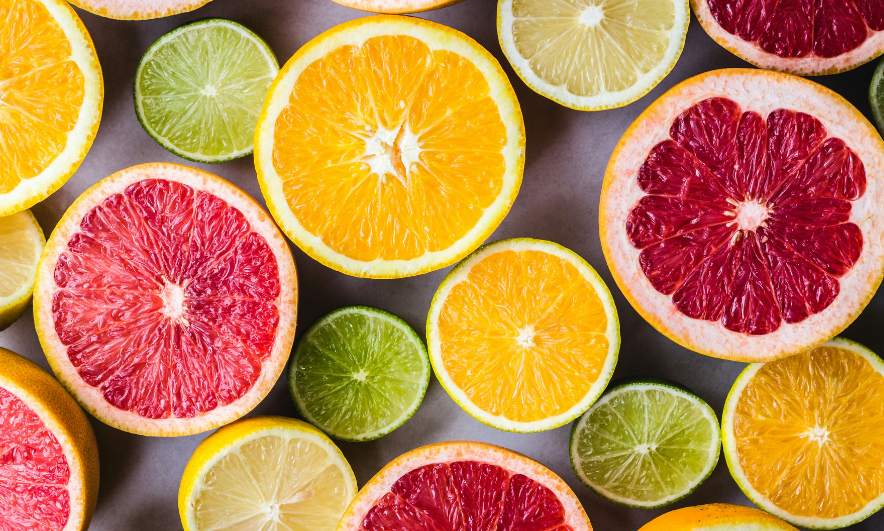During pregnancy, the mother's hygiene and diet have a direct influence on the development of the fetus. Its mother's blood is the only source of nourishment for this fragile new organism!
There is no need to return here to the principles of general food hygiene which must be respected by the mother: abstinence from alcohol and other toxic substances which pass through the blood; limitation of ultra-processed foods rich in additives in favor of simple and fresh foods; increased protein requirements in proportion to fetal weight, etc.
In this article we emphasize the particular importance of certain vitamins for the good growth and development of the fetus.
The importance of nutrients in pregnant women
A vitamin is a substance not produced by the body which acts at low doses on target functions.
Each vitamin has an optimal daily intake range, often proportional to the subject's weight. Consequently, excess vitamins can also be harmful but they are rare and the alert thresholds are well defined.
On the other hand, vitamin deficiency is the situation where intakes are permanently below the minimum. This can result in dysfunction of the body or sometimes irreversible damage.
Vitamin intake is therefore important at all ages , but they are logically crucial for the good development of the baby.
Throughout pregnancy , it is obviously the mother's diet that will provide the fetus with good nutrients. Any deficiency or excess of essential vitamins should therefore be avoided.
Vitamins essential for fetal growth and development
Among all the micronutrients, 3 stand out for their importance in pregnant women.
Vitamin B12 and the development of the nervous system
It is very likely that vitamin B12 supplementation will be routinely recommended for all pregnant women in the near future.
This vitamin plays an essential role in the production of red blood cells and is crucial for the optimal development of the nervous system and cognitive abilities of the fetus.
In association with folic acid (vitamin B9), vitamin B12 actively participates in the synthesis of DNA, which constitutes the genome. Any vitamin B12 deficiency, even temporary, can have harmful consequences for the fetus.
What is the dosage of vitamin B12 during pregnancy?
The ambiguity around vitamin B12 supplementation comes from the idea that a meat-based diet is always sufficient to cover needs.
However, many farmed meats are very low in vitamin B12. According to an American study, 100 grams of chicken breast only provides 0.3 micrograms of vitamin B12. Thus, you would have to consume around 3 kg of chicken per day to obtain an adequate dose of B12, or 10 µg/day!
It is important to distinguish "red" meats from ruminants such as cattle and sheep, which have significant levels of vitamin B12 thanks to their stomach flora, from "white meats" and eggs which are much lower in B12. .
If you eat mostly white meats, supplementing with vitamin B12 during pregnancy is a very wise precaution. For vegetarians and vegans, B12 supplementation is obviously mandatory, even more so in this phase.
Thus, due to the uncertainties concerning the actual intakes from the current diet and the fact that there is no risk of overdose of vitamin B12, it is prudently recommended to systematize B12 supplementation during pregnancy to ensure a daily intake of at least 10 micrograms.
It should be noted that the value recommended by health authorities for the recommended daily intake (RDA) for B12, set at 2.5 µg, is contested by the majority of nutritionists who recommend 10 µg/day, or even 15 µg/ day for pregnant women.
Vitamin B9 (folic acid and folate): from the pregnancy plan!
During the first weeks of pregnancy, vitamin B9, (folic acid) , is crucial for the development of the embryo's brain and spinal cord.
This is why it is essential to consider supplementary intakes as soon as possible, preferably in the months preceding the start of pregnancy.
Folic acid deficiency during weeks 3 and 4 is one of the main causes of neural tube birth defects, such as “Spina Bifida”.
Which form of Vitamin B9 should you choose: Folate or Folic Acid?
In the diet, folate is mainly found in green vegetables, in a methylated form directly usable by the body.
However, they are sensitive to heat and can deteriorate during cooking. In contrast, folic acid must undergo methylation in the body to become active.
It would be logical to favor folate intake rather than folic acid. However, the following points should be taken into account:
- To obtain active folates, you would have to consume fresh green vegetables, with no guarantee as to the proportion actually available after cooking.
- New forms of “methylated” folates (including 5 MTHF Methyltetrahydrofolic) more stable than natural folates (but less stable than folic acid) are available on the market. Easily destroyed above 50°, these shapes are not very suitable for tablets which are exposed to high temperatures during their manufacture. Furthermore, the EFSA emphasizes that "studies in infants, children, pregnant and breastfeeding women, the elderly as well as people with genetic polymorphisms affecting one-carbon metabolism would also add precision to the conversion factor of 5MTHF in EFA (dietary folate equivalent). In practice, it is better to moderate the daily doses of 5MTHF (below 600 µg).
- The classic Folic Acid has the advantage of great stability over time, which is important for a reliable intake corresponding to the announced dose. In the presence of vitamin B12, its conversion to methyl folate in the body is effective.
How much vitamin B9 for pregnant women?
Supplementing with folic acid (and vitamin B12) alongside a diet rich in fresh vegetables is a safe and reliable choice.
According to ANSES recommendations, pregnant women should aim for an average daily intake of around 600 µg of EFA - Food Folate Equivalent (i.e. around 350 µg of Folic Acid) or double the daily needs of adults.
This is why a combination of a diet including green vegetables and folic acid supplementation is wise to meet these increased needs.
Vitamin D: the 3rd fundamental vitamin during pregnancy. And after !
For the general population, vitamin D acts in synergy with calcium to assimilate it and fix it on the bones . It also participates in cell reproduction and the proper functioning of the immune system .
In the fetus, the role of vitamin D is fundamental for:
- Ensure adequate fetal bone mineralization, reduce the number of neonatal hypocalcemia and rickets in infants.
- Reduce the risk of pre-eclampsia or low birth weight of the baby.
The body knows how to synthesize vitamin D by exposing the skin to the sun, which explains the deficits generally observed in populations in winter.
Food sources of vitamin D are mainly animal sources (cod liver, etc.), but today we find vitamin D3 extracted from lichen as a supplement.
How much vitamin D3 for pregnant women?
The importance of good vitamin D intake is known to all health professionals. And this, during pregnancy and from the first days of life of the newborn in the maternity ward.
According to the College of Obstetricians, the recommendations for pregnant women increase up to 1000 IU/day from the 6th month.
ANSES, for its part, estimates satisfactory intakes for the entire duration of pregnancy at 600 IU/day (i.e. the adult RDA).
For newborns, the recommendations are 400 IU/day from birth, with a tolerance of up to 800 IU from one year of age.
Note: breast milk is low in vitamin D, even when the mother's intake is satisfactory. Under no circumstances can breast milk be considered sufficient for the baby's vitamin D needs.
Please note, remember to inform the doctors concerned of your vitamin D intake (and then that of the baby).

Other vitamins not to neglect during pregnancy
Since vitamins are involved in all physiological mechanisms, it is easy to generalize by saying that any vitamin deficiency should be avoided during pregnancy, with the exception of vitamin A in the form of retinol (see below).
Vitamin C
Vitamin C is useful for the proper assimilation of iron and the synthesis of proteins necessary for fetal growth. Vitamin C is also a marker of good general nutrition since it is found in most fresh fruits and vegetables, especially citrus fruits. It is important to maintain or improve your balanced diet with a large proportion of fruits and vegetables, also better prevention against constipation, which is more common during pregnancy.
With a lesser role than B12 and B9, the other B vitamins (in which we can include Choline/Vitamin B4) also contribute to the proper development of the fetus.
Vitamin E
Vitamin E contributes to the healthy neurological development of the fetus and its resistance to infections. It is important throughout pregnancy.
Vitamin H (Biotin)
The increase in vitamin H (Biotin) requirements during pregnancy is relatively poorly defined. However, deficiency symptoms (brittle hair and nails) are more frequently observed in pregnant women, which may justify increased vigilance.
Vitamins K1 and K2
Anti-coagulant vitamin K1 is useful to limit the risk of internal bleeding.
However, it is poorly transmitted through the mother's blood, which is why injections are commonly given by pediatricians from birth, to avoid the risk of hemorrhagic syndromes.
Is vitamin K2 mainly involved in the fixation of calcium in bones. It is therefore interesting in this respect because from the 3rd month of pregnancy the mother must mobilize a significant part of her calcium reserves for the growth of the baby's skeleton.
Special cases of vitamins to watch out for during pregnancy
Vitamin A and the risk of excess
A particular point of vigilance: vitamin A in the form of retinol.
You should not have an excess of vitamin A in the form of Retinol during the first months to avoid (rare) risks of fetal malformation.
On the other hand, there is no problem identified with the other source of vitamin A: carotenes (or 'pro vitamin A).
It is prudent to avoid all supplements containing Retinol.
Vitamin B12 in Vegans and Vegetarians
For vegans and vegetarians, vitamin B12 supplementation must be systematic for everyone, at all times, especially during pregnancy.
What to remember about nutrients and pregnancy
A varied diet based on fresh, minimally processed products and good hydration are the essential bases for good pregnancy hygiene.
Vitamin B12, B9 and vitamin D are the 3 fundamental vitamins , but having contributions of other vitamins (E, H, K) remains necessary.
At Argalys, we have developed a wide range of vitamins suitable for pregnancy, without controversial additives and without animal contribution.
Our Mul tivita mines and minerals formula is retinol-free but reinforced with vitamin B12 and D, also with a complete supply of essential nutrients (B9, E, H, K) and vitamin A exclusively in the form of Beta carotene (pro-vitamin At and in moderate doses).
Find the essentials for pregnancy here !
 04 74 03 98 80
04 74 03 98 80









